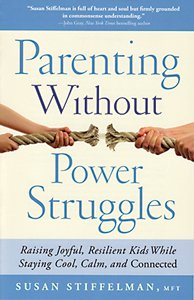
Parenting Without Power Struggles – Helping Kids Deal with Frustration
 “When parents intervene because their child is frustrated – believing they’re doing so out of love and care – they prevent him from learning how to adapt. As a result, when their child experiences something upsetting later in life, he either demands that circumstances bend to his will or becomes aggressive,” argues Susan Stiffelman, author of Parenting Without Power Struggles.
“When parents intervene because their child is frustrated – believing they’re doing so out of love and care – they prevent him from learning how to adapt. As a result, when their child experiences something upsetting later in life, he either demands that circumstances bend to his will or becomes aggressive,” argues Susan Stiffelman, author of Parenting Without Power Struggles.
The way Stiffelman explains children dealing with frustration reminds me of the way unsettled issues might arise when a couple fights. She claims until a child, like an adult, finally hits “the Wall of Futility” they can’t accept the loss and move on, which is why so many children quickly lose their temper or fall to tears. They are about to burst from unresolved emotions. However, Stiffelman is careful to clarify that “Hysterical, manipulative crying or crocodile tears are not the same as sadness.”
Stiffelman believes “Unresolved frustration produces aggression, either verbal or physical. A child who is prevented from getting what he wants and who lacks the ability to come to terms with disappointment will manifest aggression, either toward others or toward themselves.” This is why Parenting Without Power Struggles argues parents shouldn’t teach, advise, or lecture in the heat of the moment. “A child cannot process what you’re saying when he’s upset, and the onslaught of words you deliver to try to convince him to see things a different way just aggravates him more.” Furthermore, according to Stiffelman, once you’re involved in negotiations to explain why your child can’t have or do something, you’re no longer in charge.
Apparently, the key is “Use a BIG, FAT PERIOD at the end of your sentence rather than rambling on about why he can’t have what he wants.” Stiffelman believes parents can’t waiver or worry that your child might not like them. To even say, “I don’t think you should watch any more television,” undermines your authority because you think whereas remaining in charge requires that you know.
Instead, Stiffelman suggests, you should “choose time when you and your child are getting along well and the atmosphere is relaxed and comfortable to reduce the pent-up frustration that fuels meltdowns… Your job is to simply help your child feel heard and thereby drain the tank of built up frustration that feeds her outbursts.”
“When someone is upset, even though we might think he wants the other person to agree with him, the truth is, he just wants to be heard and understood,” explains Stiffelman. This is why she recommends paying a game called, “The Three Yeses.” In it, the child faces the parent and talks for two minutes about whatever is upsetting him. The parent simply listens “without preparing a rebuttal, interrupting, or rolling her eyes.” Then, the parent rephrases three things the child said in such a way to prompt the child to say, “Yes.” Stiffelman feels this game helps children understand that “we’re unquestionably on their side,” which makes them more inclined to be receptive to our support and direction.
As far as Stiffelman is concerned, “The basic idea is that instead of figuring out how to fix a problematic situation, you think back to the point at which you could have prevented it from happening and resolve to take action at that juncture in future interactions with your child.” In other words, “If whining is the answer, what is the question?” The more you think big picture, the more success you’ll be at remaining in charge, Parenting Without Power Struggles maintains.
“One of the core requirements for contentment is the ability to be at peace with our circumstances, our environment, and ourselves,” Stiffelman argues. “Whether it’s a relationship, a promotion, or a million other circumstances that don’t unfold as we had hoped, our ability to live joyful and successful lives depends on our ability to adapt.”
Ultimately, Stiffelman’s advice reminds me of Sheryl Crow song lyrics, “It’s not having what you want. It’s wanting what you’ve got.” This leads me to conclude if Parenting Without Power Struggles requires being the captain of the ship, then it would seem you need to make sure both you and your passengers regularly hits the deck to “Soak Up the Sun.”
Don’t forget to like Parenting by the Book on Facebook for updates on blog posts.
Read my other blog Befriending Forty and find out what happens when the person you thought you’d be meets the person you actually became.






